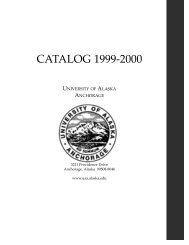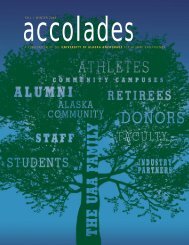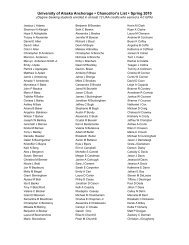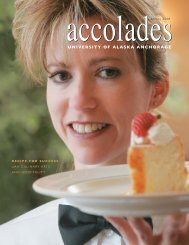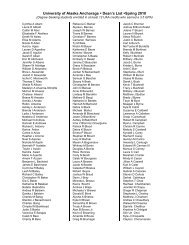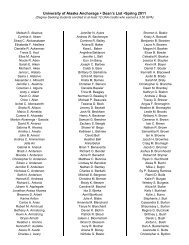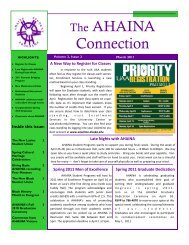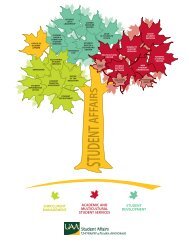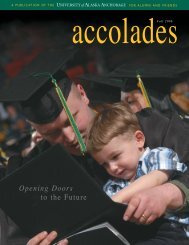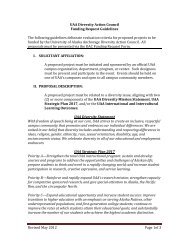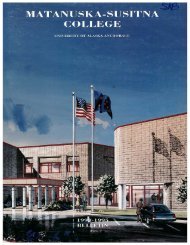Professional Counselor Portfolio - University of Alaska Anchorage
Professional Counselor Portfolio - University of Alaska Anchorage
Professional Counselor Portfolio - University of Alaska Anchorage
Create successful ePaper yourself
Turn your PDF publications into a flip-book with our unique Google optimized e-Paper software.
that domains and components should be reflective <strong>of</strong> the foundation areas identified by<br />
the Council for the Accreditation <strong>of</strong> Counseling and Related Educational Programs<br />
(CACREP). It should be noted that the CACREP foundations areas parallel the course<br />
work requirement as mandated by the National Board <strong>of</strong> Certified <strong>Counselor</strong>s (NBCC)<br />
for the purpose <strong>of</strong> admission to complete the National Certification and Licensure Exam<br />
(NCLE). Successful passage <strong>of</strong> this exam is required for consideration <strong>of</strong> the designation<br />
National Certified <strong>Counselor</strong> (NCC). A further note is that the <strong>Alaska</strong> Board for<br />
Licensed <strong>Pr<strong>of</strong>essional</strong> <strong>Counselor</strong>s requires successful completion <strong>of</strong> the NCLE as well.<br />
Is there empirical pro<strong>of</strong> that any approach is more effective? Alschuler (1996) pointed<br />
out that there is no scientific evidence that any portfolio design has proven to be an<br />
effective tool when used in solitude to assess student competence. Difficulty in<br />
standardizing the content, scope, format, and data collection is a noted disadvantage in<br />
using portfolios as a sole predictive instrument. Alschuler, after reviewing more than 100<br />
research abstracts, did note that using the portfolio as an evaluative tool in addition to<br />
traditional procedures such as course assignments and exams does have value. As noted<br />
by Baltimore et al. (1996), “portfolios represent a more genuine and authentic form <strong>of</strong><br />
assessment because they measure learning outcomes directly through demonstration and<br />
performance. Additionally, they serve to integrate the learning experienced by students<br />
across course work in the degree programs” (p. 113). Alschuler (p. 134) stated some<br />
general advantages appear to be that the portfolio:<br />
Measures directly what counselors should know and should be able to do;<br />
valuable outcomes in their own right.<br />
Demonstrates how discrete knowledge and skills are integrated and applied in real<br />
contexts.<br />
Allows flexibility and individualization how each person is assessed.<br />
Requires extensive, continual self-reflection.<br />
Encourages ongoing assessment, measurement <strong>of</strong> growth and updated educational<br />
plans.<br />
Provides useful evidence in getting jobs.<br />
Generates greater satisfaction and less anxiety for students.<br />
What part do portfolios play in the <strong>Counselor</strong> Education Program? The <strong>Counselor</strong><br />
Education Program at the <strong>University</strong> <strong>of</strong> <strong>Alaska</strong> <strong>Anchorage</strong> has adopted the portfolio as<br />
the capstone experience for demonstrating attainment <strong>of</strong> program outcomes. The<br />
pr<strong>of</strong>essional portfolio has also been approved by the College <strong>of</strong> Education and the<br />
<strong>University</strong> to serve as the culminating academic activity.<br />
The program outcomes are:<br />
Communicate essential knowledge and understandings <strong>of</strong> the pr<strong>of</strong>ession <strong>of</strong><br />
counseling including an ability to integrate knowledge into personally meaningful<br />
frameworks.<br />
o The counselor exhibits foundational knowledge <strong>of</strong> the pr<strong>of</strong>ession <strong>of</strong> counseling including critical events,<br />
credentialing, individual counseling theories, group counseling dynamics and theories, and career counseling<br />
theories. The counselor articulates a personal orientation to counseling that is congruent with literature in the field.<br />
Apply practical knowledge that is developmentally appropriate to individuals and<br />
groups.




